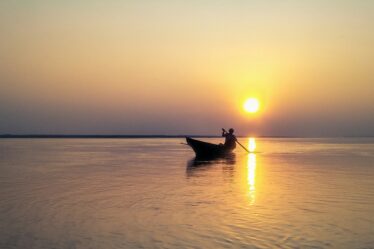The plight of fishermen traversing the Palk Strait, which marks the maritime border between India and Sri Lanka has been mired in controversy ever since the Independence of both the states. The narrow strip of water way called the Palk Strait separates Tamil Nadu in India from the Mannar district of Sri Lanka. Its width is between 53 and 80 kilometres. This narrow strait has been a cause of confusion and conflict over the use of the waters, particularly for activities such as fishing. Fishermen of both India and Sri Lanka have been victims of not only natural calamities but also imperceptible human-made geographical borders. The frequent interceptions by the naval forces has led to arrests of a large number of fisher folk who have been imprisoned for unknowingly crossing the indistinct maritime border between the two countries. One of the main bones of contention in the diplomatic domain remains the issue of fishermen in the region, with both the governments not being able to reach any concrete and once-and-for-all resolution as yet.
The Law of the Sea Convention of the United Nations (UNCLOS) says that any state has the rights to the use of marine and other resources for distance up to 200 nautical miles from the coast. This 200-nautical miles stretch is known as the Exclusive Economic Zone (EEZ). Sri Lanka's and India's EEZs overlap in the Palk Strait. This has now resulted in conflict between fishing communities of the northern part of Sri Lanka and Tamil Nadu of India as well as an irritant in the already problematic bilateral relations between the two neighbours. This issue has been a staple headline in newspapers of both countries as it often invites wide attention.
Indo-Sri Lanka ties have seen their ups and downs in the past. In the face of the growing impact of China’s engagement in the South Asian region, diverging interests between Sri Lanka and India threaten India’s prospects of being the only regional power in South Asia. India, which is Sri Lanka’s geographically proximate and largest neighbour in the South Asian region, shares a unique age-old religious, ethnic, cultural and intellectual ties with Sri Lanka. In recent years, these convivial relations, have however stumbled upon several setbacks.
The Sri Lankan Tamil fishermen from the northern part of Sri Lanka had been unable to freely fish during the protracted conflict between the Government of Sri Lanka and the Liberation Tigers of Tamil Eelam (LTTE) because the Government had imposed a wide range of security restrictions on fishing. With the military victory of the Sri Lankan forces in May 2009, the Government lifted the restrictions and the fishermen could then navigate through the waters in the maritime region without any interference. This was unimaginable a few years ago. The revenues generated by the Tamil fishermen of Sri Lanka, however, seems to be getting endangered to some extent due to encroachment by their counterparts of the Indian state of Tamil Nadu. Relaxation of fishing restrictions and diminution of constant patrolling in the territorial waters of the island nation has caused regular clashes between the Sri Lankan and Indian fishermen. Given the prevailing situation, the rights of the fishermen of both countries should be protected by the respective Governments as fishing remains the only livelihood option for the people in the region. Moreover, these fishermen hardly understand the technical and legal details with regard to the subject of maritime borders and security.
In view of unsuccessful diplomatic attempts despite the meetings of the Indo-Sri Lankan Joint Committee on Fisheries, a viable solution should be found for addressing this maritime quandary. The Indian Government as well as the political parties in Tamil Nadu should find an effective solution to the issue without making this a part of their agenda directed at vote bank politics. Otherwise, the Tamil fishermen in the northern parts of Sri Lanka would be forced to compromise their fishing and livelihood rights.
The use of technology like the Global positioning System (GPS), RADAR navigation system, Automatic Identification System (AIS) in coastal areas and mobile phone alerts, whenever they cross into another country’s waters could be an effective solution to the issue. India could take initiatives to utilize efficient ways to prevent sea encroachment and intrusion. In addition, the Governments can introduce subsidy schemes as compensation to reduce their dependence on fishing and excessive catch.
Both the Governments should include representatives of the fishermen in their negotiations in order to explore various avenues for bilateral cooperation in fisheries. Other more retributive methods such as firing, fines, detention, and confiscation of the fishing vessels and belongings of the fishermen have not brought about conducive results to put an end to this knotty issue. The recent detention of 57 Indian fishermen along with eight boats has not gone down well with the Indian establishment and particularly the Tamil Nadu Government. Moreover, the fishermen should be informed of recurrent regulations in order to prevent them from crossing the maritime borders and exploiting the marine resources in the waters of another country. The Governments should not let this issue become a thorn in their longstanding relations.
The sooner one finds an amicable solution, the better it is for the fishing communities. This would also play a big role in preventing illegal fishing by any one side. It could also open the doors for future exploration and management of seabed and underwater resources by the two neighbouring countries. Imagine the scope and nature of conflict that could arise when one finds oil, gas or minerals under the sea in the region! It remains to be seen whether India and Sri Lanka would be able to keep their disagreement aside and address this issue for the betterment of the largely innocent fishermen and the preservation of relative peace.
Disclaimer: The views expressed in this article are personal.
Priyakala Manoharan, Master’s degree in South Asian Studies from Pondicherry University, India and a Bachelor’s degree in Sociology from Peradeniya University, Sri Lanka.

